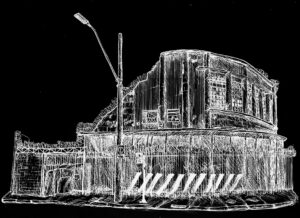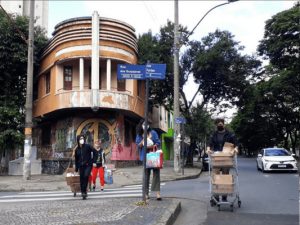 Comrades from the Kasa Invisível squat in Belo Horizonte, Brazil, are now touring all around Europe to present the book Casa Encantada, the Enchanted House, “A Portrait of the Fight for Housing in Belo Horizonte Going Through the Pandemic”. The book brings together illustrations by Renato Baruq and photographs by Cadu Passos. During 2022 and 2023, two Brazilian artists and organizers documents almost 20 old abandoned houses in the central region of Belo Horizonte that became living social and cultural spaces for people in vulnerable situations during the pandemic. The work is accompanied by interviews conducted between 2022 and 2023, which tell the story of these properties and their inhabitants in their own voices. [Read More]
Comrades from the Kasa Invisível squat in Belo Horizonte, Brazil, are now touring all around Europe to present the book Casa Encantada, the Enchanted House, “A Portrait of the Fight for Housing in Belo Horizonte Going Through the Pandemic”. The book brings together illustrations by Renato Baruq and photographs by Cadu Passos. During 2022 and 2023, two Brazilian artists and organizers documents almost 20 old abandoned houses in the central region of Belo Horizonte that became living social and cultural spaces for people in vulnerable situations during the pandemic. The work is accompanied by interviews conducted between 2022 and 2023, which tell the story of these properties and their inhabitants in their own voices. [Read More]
Belo Horizonte: european tour for the book Casa Encantada
Belo Horizonte (Brazil): “Casa Encantada” book project
Hello comrades! We, from the Kasa Invisível squat in Belo Horizonte, Brazil, wish everyone a happy new year of struggle, solidarity, and revolutionary construction.
We’re writing to friends and accomplices from various parts of the globe, those we’ve met on the road, corresponded with, who we’ve visited, or whom visited us at our squat, to announce the campaign we are organizing on the FireFund platform to launch the book “Casa Encantada” (Enchanted House). The book documents 20 autonomous occupations in Belo Horizonte, most of which emerged during the pandemic. We hope through this campaign to be able to translate it into four languages and conduct a tour and launch in cities in Brazil and Europe in 2024 and debate the great differences and similarities of these two contexts of struggle for housing, and how to build solidarity. [Read More]
Belo Horizonte: Kasa Invisível, Solidarity, Direct Action, and Self-Determination
 An Occupied Social Center Becomes a Hub of Mutual Aid in Belo Horizonte, Brazi.
An Occupied Social Center Becomes a Hub of Mutual Aid in Belo Horizonte, Brazi.
Through interviews with the founders and participants, we explore how an occupied social center and housing collective in Brazil has continued to function as a hub for mutual aid through the pandemic. This is the third installment in a series exploring mutual aid projects around the world in the era of covid-19.
The Zapatistas have said the best solidarity anyone can offer is to start their own social centers, projects, movements, and revolutions wherever they are based. In Belo Horizonte, the capital city of the state of Minas Gerais in southeastern Brazil, a collective called Kasa Invisível (Portuguese for “Invisible House”) has heeded that proposal, and hopes to inspire you to do the same.
The three formerly abandoned houses now occupied by this autonomous, anti-capitalist collective serve as a home for people in need, a social and cultural center for the community, and a meeting and organizing space for anti-authoritarian resistance and mutual aid. While there are hundreds of building and land occupations in Minas Gerais alone, Kasa is one of only a few squats in the region that explicitly exist to support struggles against the state and capitalism. [Read More]
Belo Horizonte (Brazil): For Squat Kasa Invisível, keep your support, we’re almost there!
First of all, we want to thank every one, every collective, union, and groups supporting us! We already reached almost 2,000 dolars to fix the entire roof of our squat. Keep sharing the message to those which are in a position to help us keep our work and our house! Stay safe and healthy!
Video Campaign:
Belo Horizonte (Brazil): The feminist squat Tina Martins threatened with eviction
On March 8th, the feminist movement Olga Benário squatted an empty building in the center of Belo Horizonte, with the hope of turning it into a crisis shelter for female victims of violence. Since then, the building is occupied as a place of living for dozens of women, and holds every day gatherings, assemblies, culturals and political events. It also works as a self-managed crisis shelter: a psychological and medical reception center for more or less 200 women who are homeless or victims of violence.

